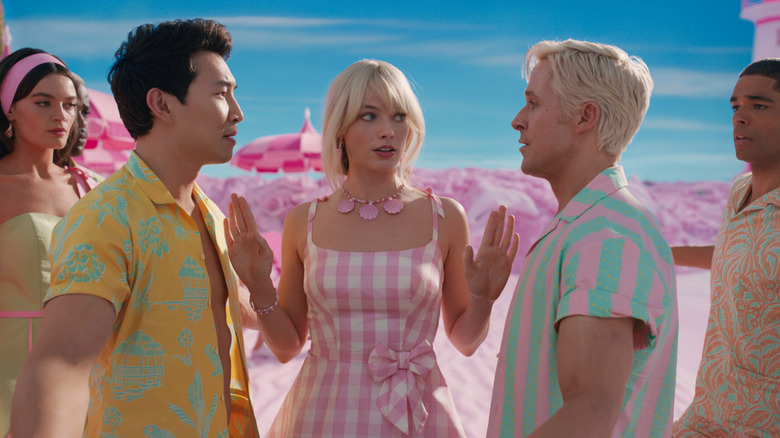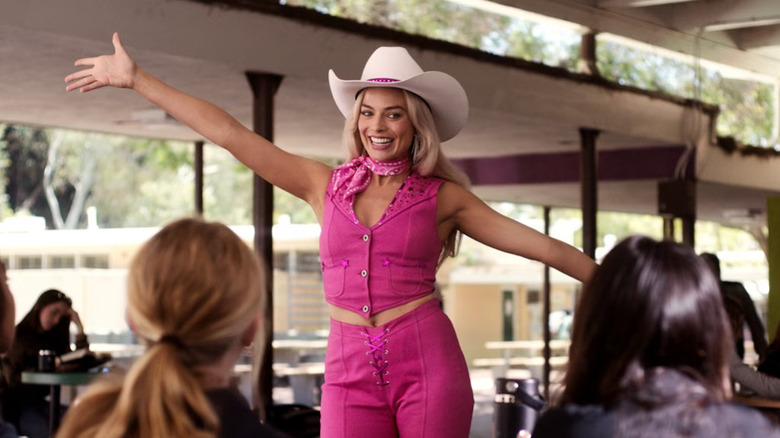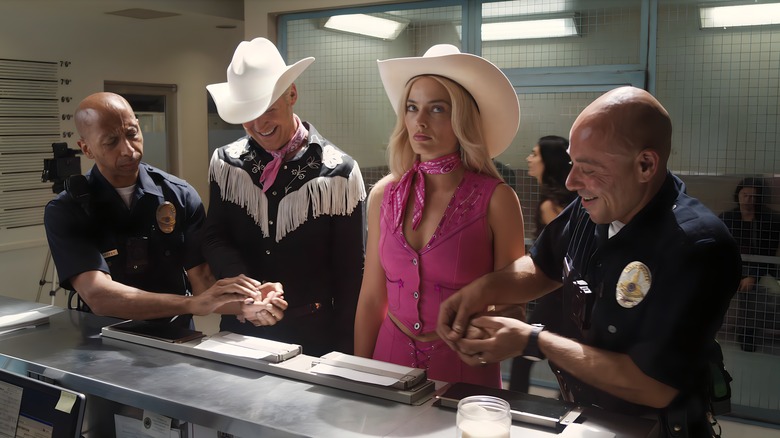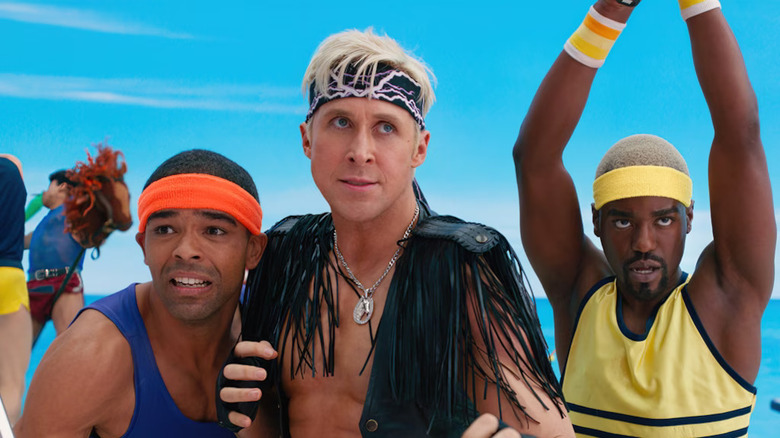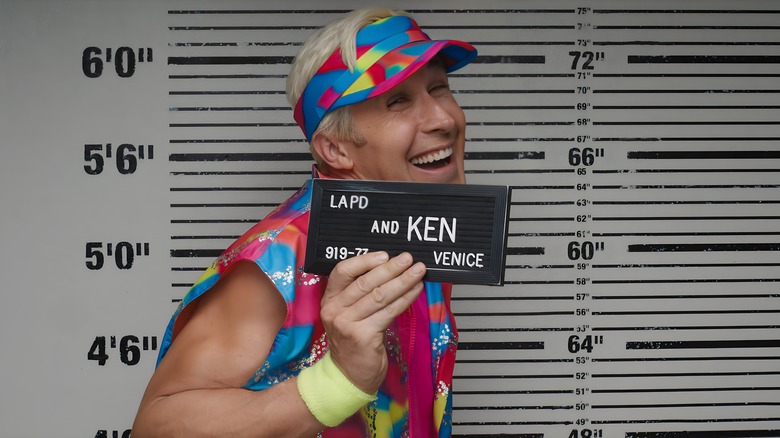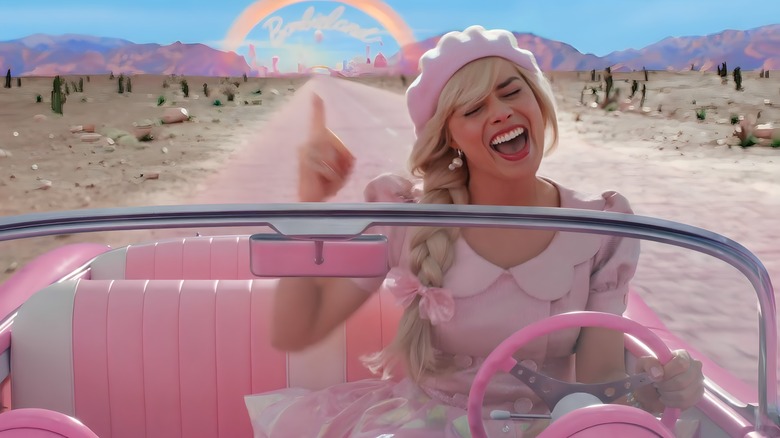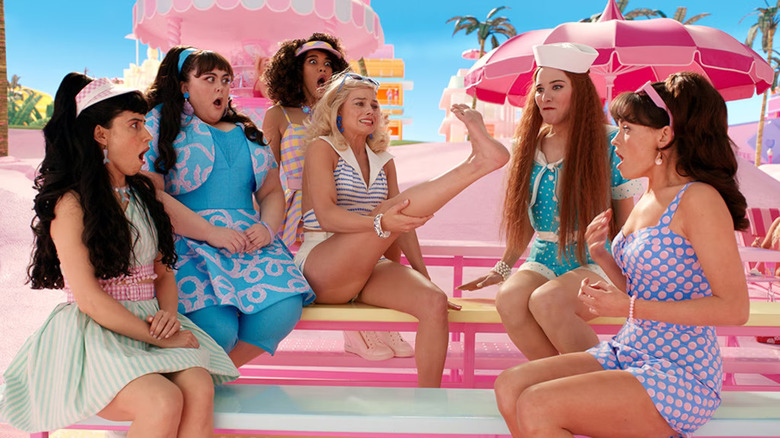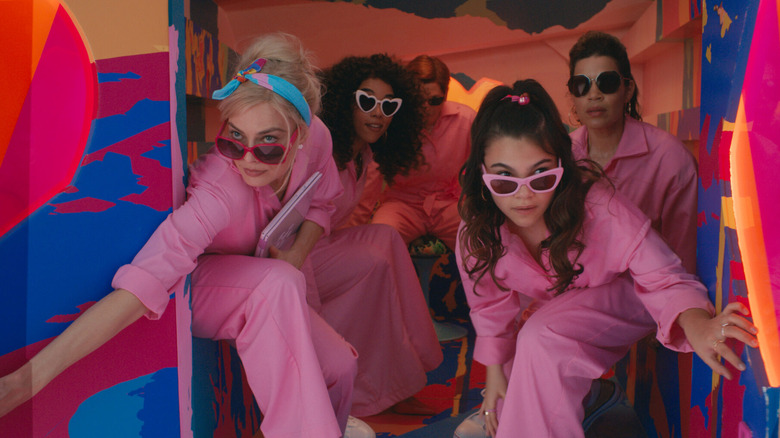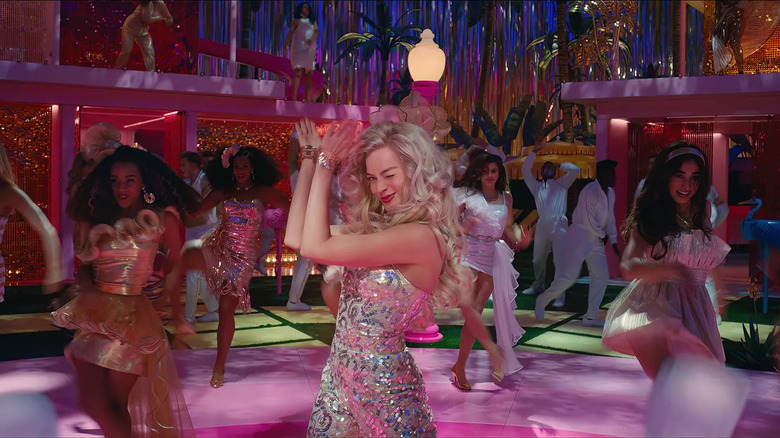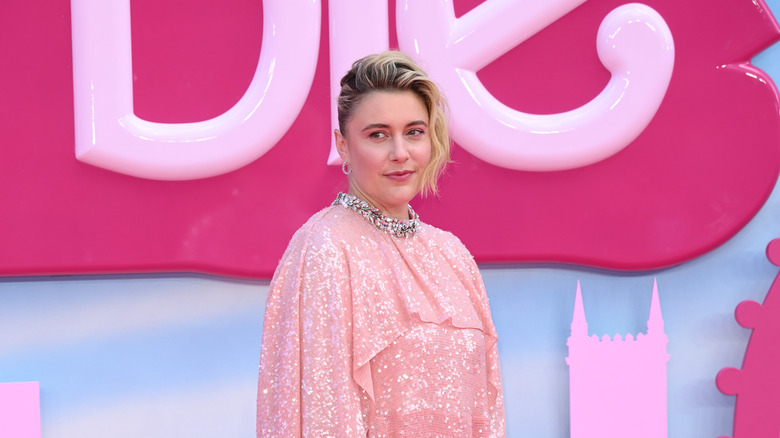The Ending Of Barbie Explained
Contains spoilers for "Barbie"
Greta Gerwig's "Barbie" is one of the hit movies of the summer, with more advance ticket purchasing than any title since "Avatar: The Way of Water." It should be no surprise that something this colorful, hilarious, and touching would connect with such a diverse array of audience members. Gerwig may have cut her teeth in the business working on smaller budgets, but no matter the scope of the story she sets out to tell, she has always grounded her work with sincerity and humanism. With "Barbie," she's filtered the entire history of the "Barbie" franchise and its impact on women for the last six decades into a prismatic look at femininity and the very meaning of life. It's also a very campy, silly genre exercise based on a toy brand it spends the runtime both lambasting and lionizing.
While people have preemptively profiled "Barbie" as the confectionary dessert waiting at the end of a double feature with "Oppenheimer," the film is not exactly the easy-to-digest popcorn flick everyone seems to expect. There's broad comedy and gorgeous aesthetics on display, but there is also plenty under the hood to reflect upon long after the credits have rolled. Throughout the story, magical fairy-tale leaps give way to earthbound introspection and existential morass. It's in the distance between the two that "Barbie" functions the best. So let's run through the film's many delights and pick apart the layers of this metatextual cake.
What you need to remember about the plot of Barbie
"Barbie" begins with our Barbie (Margot Robbie) in Barbieland, the fantastical, pastel-colored feminist utopia home to every Barbie who has ever lived. There's President Barbie (Issa Rae), Doctor Barbie (Hari Nef), Writer Barbie (Alexandra Shipp) and so many others. There's Kens, too. They're all named Ken, even Barbie's Ken (Ryan Gosling). Every day, Barbie has the best day of her life, while Ken just hopes Barbie will look his way. In Barbieland, there is no conflict. Just Barbies Barbie-ing, building one another up with praise and support and love, while Kens Ken, pining on the outskirts, trying to outshine one another in the hopes of some attention or respect. It is a never-ending cycle.
Until one day, Barbie's idyllic little routine begins to crumble with strange symptoms unfamiliar to her daily doll life. Barbie discovers that the issues she's facing — cellulite, pervasive thoughts of death — are the result of the tether between Barbieland and the real world. Basically the Barbies in Barbieland are inexorably tied to the humans who play with them in the real world. Whatever child is playing with Barbie is struggling with more complex issues, and they're poisoning Barbie's otherwise perfect existence. The only way for her to restore herself to factory settings is to physically go into the real world, a place that — as far as all the other Barbies have always believed — is also a feminist utopia as the result of their inspirational work in Barbieland.
Barbie discovers the patriarchy
Once she traverses the theoretical wormhole between the two realms, with her stowaway Ken in tow, Barbie is immediately struck by the reversal of power in this society's hierarchical structure. Simply put, men rule the world here, and women do not, a paradigm shift that perturbs Barbie but intrigues Ken. If that culture shock wasn't enough, when she finally finds Sasha (Ariana Greenblatt), the young girl Barbie saw in her visions as the disaffected child causing her issues, she is stunned to discover that she and her Gen Z friends hate Barbie. She's unmoored by the passionate, damning indictment they inflict upon her, noting Barbie's toxic cultural footprint, crass consumerism, and noxious effect on beauty standards and thus women's mental wellness over half a century. At her lowest point, she is kidnapped by Mattel agents at the order of their CEO (Will Ferrell).
Everyone at Mattel just wants Barbie to get back in a box to teleport her back home, before her and Ken's presence here has the same effect on the real-world Sasha's cynicism has had on Barbie. But she flees before being saved by Sasha's mother, Gloria (America Ferrera), a Mattel employee who is revealed to be the real cause of Barbie's flight. She had been toying with her and her daughter's old dolls in an attempt to reconnect with her grouchy, disaffected child.
Barbie convinces them to join her back in Barbieland, hoping being able to show them the paisley majesty of her home will inspire Sasha to be less jaded and to stop hating Barbie as a cultural icon. Perhaps it'll help repair their mother-daughter relationship in the process and, at least on a smaller scale, fulfill some of the destiny Barbie had thought already completed before her unfortunate sojourn to the real world. That is, until they actually make it back to Barbieland to discover it is not what it once was. It is now ... Kendom.
What happened at the end of Barbie?
With no real allies among the dolls and not feeling special enough to enact change if President Barbie and the others have given into being trad-wives, our Barbie lays down and gives up. Hiding out from the macho madness that Barbieland has become, Gloria, Sasha, and Barbie post up at Weird Barbie's compound, Gloria gives Barbie a dramatic and heartfelt speech about the inherent difficulty of being a woman and it snaps Barbie out of it. The gang first deprograms Writer Barbie and puts together an elaborate plan to do the same to each and every Barbie, one by one, by using liberated Barbies to distract Kens while Gloria gives them the talk that brings them back to life.
Step two of this plan is to systematically deflate the Kens' egos and set them against one another, playing possum and continuing to hide in plain sight under the guise of thoughtless bimbos until the right time to strike. Barbie's Ken is severely wounded at the sight of her flirting with his arch-rival, Ken (Simu Liu), leading Kens loyal to Ken to go to literal war against the other Kens loyal to the other Ken. Ken War ensues. But the initial violence and brutality don't last for very long. Somewhere along the "West Side Story"-esque dance fighting, Ken's solo song "I'm Ken" seems to strike a chord within all the other Kens, as their pugilistic voguing devolves into something more cooperative, choreographed, and collaborative. In spite of themselves, they've stumbled upon the solidarity and brotherly love their short-sighted existences had been missing out on this entire time. The war now over, Barbieland reverts to normal — with some added concessions for the Kens.
What happened to Ken at the end of Barbie?
Remember Ken? Well, back when he and Barbie first got to the real world and she was horrified to discover the patriarchal structure of society and how it was a toxic and polar opposite to the life they both knew, Ken wasn't scared of it. He was elated. After getting a bunch of books on the patriarchy from the library and subsequently failing to get an important job for the simple reason he is a man, Ken decided that the real world is doing patriarchy wrong, and he needs to take those ideas somewhere new to fully realize them.
So he functionally took over Barbieland, teaching all the other Kens how to subjugate their respective Barbies, turning the dream houses into man caves, turning the choreographed disco parties into acoustic guitar covers of Matchbox Twenty's "Push," and giving every Barbie the chance to stop being a girlboss and just pass her boy a brewski. He and all the other Kens have thrown out the constitution and corrupted everything Barbieland once was, much to Barbie's chagrin when she and Gloria and Sasha arrive.
Once the Barbies distract the Kens enough to get a vote out so they can reinstate their constitution and return Barbieland to its former splendor, Ken still doesn't know who he is or where he belongs. He realizes he lost the heart for patriarchy when he discovered it didn't involve horses to the degree he once imagined. Barbie apologizes for the way she treated Ken but has to caution him that this isn't a happy romantic ending for the two of them and that he needs to spend time and energy defining his own place in this world outside of trying to court her. President Barbie agrees to some minor concessions for the Kens, getting them more representation in their government. The Mattel execs who crossed the beach portal are satisfied, agreeing to start producing Gloria's idea for an Everyday Barbie.
What happened to Barbie at the end of Barbie?
Everyone gets some kind of conclusion they find satisfying — except for Barbie. What about her happy ending? Barbie wonders aloud if there's anything left for her to do, still feeling confused and bothered by all she's experienced. She still sees herself as too ordinary and unexceptional to deserve the kind of happy ending a movie like this is supposed to have.
But that's when Ruth Handler (Rhea Perlman), the creator of Barbie, appears. Seeing as how she's essentially God in Barbieland, she offers Barbie some holy counsel and talks to her about the true nature of life and death and what it means to be a human. Moved by all this, Barbie asks if she can be a human, too. But through all she's endured on this quirky adventure, she finds she now already is.
In the film's final moments, she is being driven by Gloria and her family to some important event, with the tenor of the scene suggesting it's to be her first day at her first human job, perhaps a gig working at Mattel as a creative, like her earlier monologue implied could be on the horizon. But for the film's final joke, her destination is revealed to be a gynecologist's office.
Did Barbie become human through magic or through suffering?
Throughout "Barbie," the story takes a number of surreal and metatextual leaps that belie further, concrete explanations. At numerous points, characters, like Mattel's CEO or Weird Barbie, or Ruth the creator herself, will offer a crucial piece of lore laden with the burning necessity for follow-up questions, only to hand wave them away like the scientist from "Tenet" telling The Protagonist not to think, but to feel it. So when the film concludes with Barbie turning from a doll to a real human being, Ruth's phrasing to her implies that this last climactic moment wasn't a bit of alchemical hokum, but rather the final act of a transformative character arc.
Barbie goes from being a one-dimensional and idealized toy whose world has never known strife, contradiction or the finality that defines a human life, to a thinking and feeling entity who endures a the full spectrum of existence all in a single day. By pulling Barbie out of the fictional and aspirational artifice she was born into and placing her within our very real world and all its infernal complications, she ascends from dollhood to girlhood, bearing the massive weight her gender must shoulder in order to simply exist.
Like most things in Gerwig's vision for the icon, it feels as though either interpretation can be read as valid. Depending on what the viewer believes in — an idealist's hopeful understanding of the nature of magic or a pragmatist's logical reasoning skills — the ending can be read, and more importantly, be believed, either way.
What was the real relationship between Barbieland and the Real World?
Just like the true nature of Barbie's final evolution, the uneasy relationship between Barbieland and the real world is a confounding one to ponder. We're told, initially, that what happens to the dolls in Barbieland is the direct result of what the kids in the real world do during playtime. So why then, is Mattel so afraid of a doll in the real world, and why does that give Barbieland similar power over reality? Rather than complex metaphysical explication here, we need to think about this in more nebulous terms. Before Barbie is a physical plaything in the real world, she is an idea — a big one — merely housed within this malleable, plastic little totem.
When Sasha lashes out at Barbie, all the particulars of her scathing rant outline the many ways that Barbie, the doll, possesses an existence that shapes the reality she was created into. The doll becomes an ideal that on some level flesh and blood women must be compared to. How can you compete with an object designed to be perfect when you're a subject born with such imperfection? We shape the zeitgeist and popular culture, but we imbue art and products and commodities with so much power, from our desires and our anxieties and our ache to escape the isolating impacts of capitalism and patriarchy. So of course the figures scrubbed clean of all our ungainly humanity bounce right back at us, reshaping the world as we know it in ways surprising and previously unimaginable.
It's also why the ideas Ken brings back from the real world wreak so much havoc on Barbieland. Barbieland's idyllic environs are informed entirely by a fragile barricade of lofty tenets, utterly undone the moment they come into contact with contradictory concepts from the broken world that initially birthed them. "Barbie," miraculously, is able to expand upon the reflexive nature of the dream and the dreamer, neither knowing who is truly asleep.
Will we see Barbie again?
Given Gerwig's unbridled enthusiasm for the brand and the film's commercial success thus far, sequels to "Barbie" are more a question of "when" rather than "if." There are plenty of Barbies and Kens to follow from this first film into their own similarly meta dramedy vehicles to iterate and evolve from the blueprint set out here in this first film. Too many talented young actors appear here for one of them to not get another shot at bat as their respective doll identities. But with Mattel pledging to exploit all the other toys in their massive IP toybox, there may be a larger Mattel cinematic universe that Barbie would merely be a player in.
How exactly, you ask, could Barbie team up with He-Man, or the cars from Hot Wheels, or Rock 'Em Sock 'Em robots? If you've made it this far and have already seen "Barbie," you know that the doors are blown wide open for any manner of tie-in to make some kind of emotional sense, even if it's found to be wanting in the logic department. Barbie could end up in Eternia and the right combination of winking, nodding, and sharply employed '80s or '90s needle drop on the soundtrack will smooth over any rockiness between the two brand's respective identities.
What has Greta Gerwig said about the ending and sequel potential?
Greta Gerwig can do no wrong. "Barbie" reviews have called the film the movie of the summer, as well as one of the best of the year, highlighting Gerwig's script (co-written with Noah Baumbach) and her direction. But will there be a sequel? "It could go a million different directions from this point," star Margot Robbie told Time.
Gerwig expressed enthusiasm about a potential "Barbie" franchise in an interview with Variety, but there are no solid plans. Whether or not Gerwig herself will return to the director's chair is a more difficult call, given the rumors around her and the "Narnia" universe over at Netflix, but a more tantalizing question is whether the Barbiverse will crossover with another toy-birthed franchise. This summer, we've already seen that Hasbro and Paramount are having their twin-toy juggernauts "GI Joe" and "Transformers" occupy the same space, and we know Mattel and Hasbro are buddy-buddy enough when it comes to mutually beneficial licensing opportunities. Who's to say the "real world" Barbie has anthropomorphized isn't the same one with robots that turn into cars and stealth ninjas working with independent military contractors to fight terrorism?
